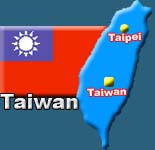Taiwan ex-president Chen denies accepting bribes at hearing
 Taipei - Taiwan's former president Chen Shui-bian on Wednesday denied accepting bribes in a land deal and embezzling state funds during a pretrial hearing in Taipei.
Taipei - Taiwan's former president Chen Shui-bian on Wednesday denied accepting bribes in a land deal and embezzling state funds during a pretrial hearing in Taipei.
A fiery Chen, apparently angered by the court's rejection of his plea for release the night before, lashed out at prosecutors for using what he claimed was "questionable testimony" from a witness who had accused him of corruption.
"He should be a suspect rather than a witness," Chen said, referring to Jeffrey Koo Jr, former vice chairman of Chinatrust Financial Holding Co, who testified Chen used his wife, former first lady Wu Shu-chen, to extort money from several businessmen.
Koo testified that his uncle wanted to sell a plot of land to a government science park and Wu promised to help. Koo said his uncle finally paid 400 million Taiwan dollars
(11.4 million US dollars) to Wu through an associate of the former first lady to secure the deal.
Chen, however, told Judge Tsai Shou-hsun of the Taipei District Court that he knew nothing about the deal until he was charged with accepting bribes in mid-December. He said he suspected Koo also accepted part of the bribes because Wu later said she only received half the "commission" rather than the full 400 million Taiwan dollars.
"How can you prosecutors use such questionable testimony to accuse me of corruption?" he asked.
Chen also said the testimony provided by a defendant-turned witness, Chen Chen-hui, his former chief treasurer, had mentioned nothing about him in regards to the embezzlement charges. He said Chen Cheng-hui merely said she accounted for all the funding claims at the heart of the embezzlement allegations at the instruction of Wu and two of Chen Shui-bian's former chief aides.
The ex-president was charged with accepting 400 million Taiwan dollars in bribes and embezzling 104 million Taiwan dollars in state funds during his time as president from 2000 to 2008. He was also charged with money laundering, document forgery, extortion and influence peddling.
A total of 14 people - including the former president, Wu, their son, daughter-in-law, his brother-in-law and sister-in-law - were indicted. Except for Chen Shui-bian and his two former chief aides, all the defendants, including Wu, have pleaded guilty to money laundering. The former chief treasurer has also pleaded guilty to embezzlement.
Legal experts said Chen Shui-bian was trying to shift all the blame on his wife by suggesting she went behind his back. But at the same time, Chen Shui-bian and Wu insisted that the funds taken by Wu were political donations rather than bribes.
According to prosecutors, Wu had wired at least 1.32 billion Taiwan dollars abroad and kept 600 million Taiwan dollars in cash and 80 jewels in Taiwan and Japan.
On Tuesday, the Taipei District Court rejected Chen Shui-bian's plea for release from detention and decided to continue to detain him for another two months until May 25. His current detention period was due to expire on March 26.
The former president has been detained since December 30 at the order of the Taipei District Court on the grounds that he could flee or threaten witnesses if freed.
Citing the "possibility of fleeing abroad because of the serious crimes he had been involved in," and "the defendant's repeated attempts to use his influence to obstruct court proceedings," the court said in its latest ruling that Chen Shui-bian must be placed behind bars to facilitate the judicial proceedings.
Chen Shui-bian has insisted that his pretrial detention is a violation of his human rights. The Democratic Progressive Party politician has also claimed his prosecution is a result of political persecution by his successor, Ma Ying-jeou of the Nationalist Party. (dpa)